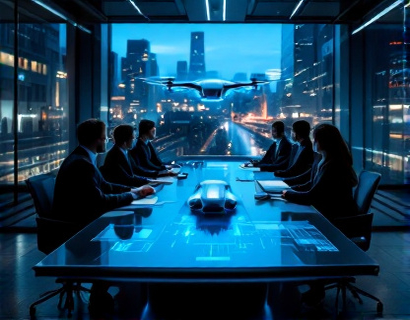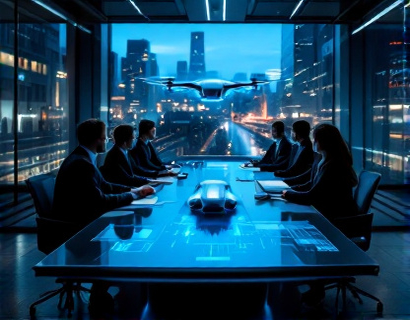AI-Powered Agent Revolutionizes Aeronautics: Streamlining Operations and Enhancing Decision-Making for Industry Professionals
The aeronautics industry, a cornerstone of global transportation and commerce, is undergoing a significant transformation driven by the integration of artificial intelligence (AI). This revolution is not just about automating routine tasks but about fundamentally changing how operations are managed and decisions are made. AI agents are at the forefront of this change, offering unprecedented levels of efficiency, accuracy, and insight. For professionals and businesses in the aeronautics sector, embracing AI is no longer an option but a necessity to stay competitive and drive sustainable growth.
Understanding the Role of AI in Aeronautics
AI in aeronautics encompasses a wide range of applications, from predictive maintenance and flight optimization to supply chain management and customer service. These AI-powered solutions are designed to handle complex, data-intensive tasks that traditionally required human intervention. By leveraging machine learning algorithms, natural language processing, and advanced analytics, AI agents can process vast amounts of data in real-time, providing actionable insights that enhance operational efficiency and decision-making.
Streamlining Operations with AI
One of the most immediate benefits of AI in aeronautics is the streamlining of operations. AI agents can automate routine tasks such as scheduling, inventory management, and maintenance planning. For instance, predictive maintenance uses AI to analyze sensor data from aircraft components to predict potential failures before they occur. This proactive approach reduces downtime, lowers maintenance costs, and ensures that aircraft are always in optimal condition for flight.
Flight planning and optimization are another area where AI excels. AI agents can analyze weather patterns, air traffic, and other variables to create the most efficient flight paths. This not only saves fuel and reduces emissions but also minimizes flight delays and improves overall travel times. By integrating real-time data, AI can dynamically adjust flight plans to account for changing conditions, ensuring the highest level of efficiency and safety.
Enhancing Decision-Making with Data-Driven Insights
Decision-making in the aeronautics industry is complex and multifaceted, involving numerous stakeholders and data sources. AI agents provide a powerful tool for enhancing this process by offering data-driven insights. These insights can range from market trends and customer behavior to operational performance and risk assessment. By analyzing historical and real-time data, AI can identify patterns and correlations that human analysts might miss, leading to more informed and strategic decisions.
For example, AI can help airlines optimize their fleet management by analyzing usage patterns, maintenance records, and market demand. This analysis can inform decisions on fleet expansion, retirement, and resource allocation. Similarly, AI can assist in pricing strategies by analyzing demand fluctuations, competitor pricing, and economic indicators, enabling airlines to maximize revenue while maintaining competitiveness.
Improving Safety and Compliance
Safety is paramount in the aeronautics industry, and AI plays a crucial role in enhancing safety protocols and ensuring compliance with regulatory standards. AI agents can monitor and analyze vast amounts of data from various sources, including flight logs, maintenance records, and regulatory updates. This continuous monitoring helps identify potential safety risks and ensures that all operations adhere to the latest regulations.
AI can also assist in incident investigation and root cause analysis. By quickly processing and correlating data from multiple sources, AI can help identify the underlying causes of accidents or near-misses, leading to more effective corrective actions. This not only improves safety but also builds trust with regulators and customers.
Optimizing Supply Chain and Logistics
The aeronautics supply chain is complex and global, involving numerous suppliers, manufacturers, and distributors. AI agents can significantly optimize this supply chain by providing real-time visibility and predictive analytics. AI can track inventory levels, forecast demand, and optimize logistics to ensure that parts and materials are available when needed, reducing delays and costs.
For instance, AI can predict component failures and schedule proactive replacements, preventing unexpected disruptions. It can also optimize transportation routes and modes to reduce lead times and costs. By integrating with suppliers and partners, AI ensures a seamless flow of information and resources, enhancing overall supply chain resilience and efficiency.
Enhancing Customer Experience
Customer satisfaction is a key driver of success in the aeronautics industry. AI agents can enhance the customer experience through personalized services and efficient operations. For example, AI-powered chatbots and virtual assistants can provide 24/7 support, answering queries, and resolving issues in real-time. This not only improves customer satisfaction but also reduces the workload on human support teams.
AI can also personalize the travel experience by analyzing customer preferences and behavior. This data can be used to offer tailored services, such as preferred seating, meal options, and entertainment choices. By understanding and meeting customer needs, airlines can differentiate themselves in a competitive market and build loyal customer relationships.
Challenges and Considerations
While the benefits of AI in aeronautics are clear, there are several challenges and considerations that must be addressed. One of the primary concerns is data security and privacy. Aeronautics involves handling sensitive information, and ensuring the security of this data is critical. AI systems must be designed with robust security measures to protect against cyber threats and comply with data protection regulations.
Another challenge is the integration of AI into existing systems and processes. This requires significant investment in technology, training, and change management. Airlines and aerospace companies must carefully plan and execute the integration to maximize benefits and minimize disruptions. Collaboration with AI experts and technology providers can help navigate these challenges and ensure a smooth transition.
Future Trends and Opportunities
The future of AI in aeronautics is promising, with ongoing advancements opening new opportunities for innovation. One area of focus is the development of more sophisticated AI models that can handle even more complex tasks, such as autonomous flight and advanced predictive analytics. These advancements will further enhance operational efficiency, safety, and decision-making.
Another trend is the increasing collaboration between aerospace companies, technology firms, and research institutions to develop cutting-edge AI solutions. This collaborative approach fosters innovation and accelerates the adoption of AI in the industry. As the technology matures, we can expect to see more widespread and sophisticated applications of AI, driving sustainable growth and competitive advantage for aeronautics professionals and businesses.
In conclusion, AI-powered agents are revolutionizing the aeronautics industry by streamlining operations, enhancing decision-making, and providing actionable insights. By embracing these technologies, industry professionals and businesses can optimize their processes, improve safety and compliance, and deliver exceptional customer experiences. The journey towards an AI-enabled future in aeronautics is just beginning, and those who lead the way will reap significant benefits in a rapidly evolving market.










































